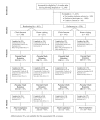Nurse-Moderated Internet-Based Support for New Mothers: Non-Inferiority, Randomized Controlled Trial
- PMID: 28739559
- PMCID: PMC5547246
- DOI: 10.2196/jmir.6839
Nurse-Moderated Internet-Based Support for New Mothers: Non-Inferiority, Randomized Controlled Trial
Abstract
Background: Internet-based interventions moderated by community nurses have the potential to improve support offered to new mothers, many of whom now make extensive use of the Internet to obtain information about infant care. However, evidence from population-based randomized controlled trials is lacking.
Objective: The aim of this study was to test the non-inferiority of outcomes for mothers and infants who received a clinic-based postnatal health check plus nurse-moderated, Internet-based group support when infants were aged 1-7 months as compared with outcomes for those who received standard care consisting of postnatal home-based support provided by a community nurse.
Methods: The design of the study was a pragmatic, preference, non-inferiority randomized control trial. Participants were recruited from mothers contacted for their postnatal health check, which is offered to all mothers in South Australia. Mothers were assigned either (1) on the basis of their preference to clinic+Internet or home-based support groups (n=328), or (2) randomly assigned to clinic+Internet or home-based groups if they declared no strong preference (n=491). The overall response rate was 44.8% (819/1827). The primary outcome was parenting self-competence, as measured by the Parenting Stress Index (PSI) Competence subscale, and the Karitane Parenting Confidence Scale scores. Secondary outcome measures included PSI Isolation, Interpersonal Support Evaluation List-Short Form, Maternal Support Scale, Ages and Stages Questionnaire-Social-Emotional and MacArthur Communicative Development Inventory (MCDI) scores. Assessments were completed offline via self-assessment questionnaires at enrolment (mean child age=4.1 weeks, SD 1.3) and again when infants were aged 9, 15, and 21 months.
Results: Generalized estimating equations adjusting for post-randomization baseline imbalances showed that differences in outcomes between mothers in the clinic+Internet and home-based support groups did not exceed the pre-specified margin of inferiority (0.25 of a SD) on any outcome measure at any follow-up assessment, with the exception of MCDI scores assessing children's language development at 21 months for randomized mothers, and PSI Isolation scores at 9 months for preference mothers.
Conclusion: Maternal and child outcomes from a clinic-based postnatal health check plus nurse-moderated Internet-based support were not inferior to those achieved by a universal home-based postnatal support program. Postnatal maternal and infant support using the Internet is a promising alternative to home-based universal support programs.
Trial registration: Australian New Zealand Clinical Trials Registry Number (ANZCTR): ACTRN12613000204741; https://www.anzctr.org.au/Trial/Registration/TrialReview.aspx?id=363712&isReview=true (Archived by WebCite at http://www.webcitation.org/6rZeCJ3k1).
Keywords: Internet; community health services; public health informatics.
©Michael G Sawyer, Christy E Reece, Kerrie Bowering, Debra Jeffs, Alyssa C P Sawyer, Murthy Mittinty, John W Lynch. Originally published in the Journal of Medical Internet Research (http://www.jmir.org), 24.07.2017.
Conflict of interest statement
Conflicts of Interest: Kerrie Bowering was the Director of Child and Family Health Services (CaFHS) until February 2016 and Debra Jeffs is the Nursing Director of CaFHS. The intervention website was built by independent Web application developers Portal Australia [25]. Intellectual property ownership was based on organizational agreements between the South Australian Department of Health and Ageing and The University of Adelaide and did not include the authors or the website developers.
Figures
References
-
- Chapman J, Siegel E, Cross A. Home visitors and child health: analysis of selected programs. Pediatrics. 1990 Jun;85(6):1059–1068. - PubMed
-
- Kamerman SB, Kahn AJ. Home health visiting in Europe. The Future of Children. 1993;3(3):39–52. doi: 10.2307/1602542. - DOI
-
- Blondel B, Pusch D, Schmidt E. Some characteristics of antenatal care in 13 European countries. Br J Obstet Gynaecol. 1985 Jun;92(6):565–568. - PubMed
-
- Robling M, Bekkers MJ, Bell K, Butler CC, Cannings-John R, Channon S, Martin BC, Gregory JW, Hood K, Kemp A, Kenkre J, Montgomery AA, Moody G, Owen-Jones E, Pickett K, Richardson G, Roberts ZE, Ronaldson S, Sanders J, Stamuli E, Torgerson D. Effectiveness of a nurse-led intensive home-visitation programme for first-time teenage mothers (Building Blocks): a pragmatic randomised controlled trial. Lancet. 2016 Jan 09;387(10014):146–155. doi: 10.1016/S0140-6736(15)00392-X. http://linkinghub.elsevier.com/retrieve/pii/S0140-6736(15)00392-X - DOI - PMC - PubMed
Publication types
MeSH terms
Associated data
LinkOut - more resources
Full Text Sources
Other Literature Sources


